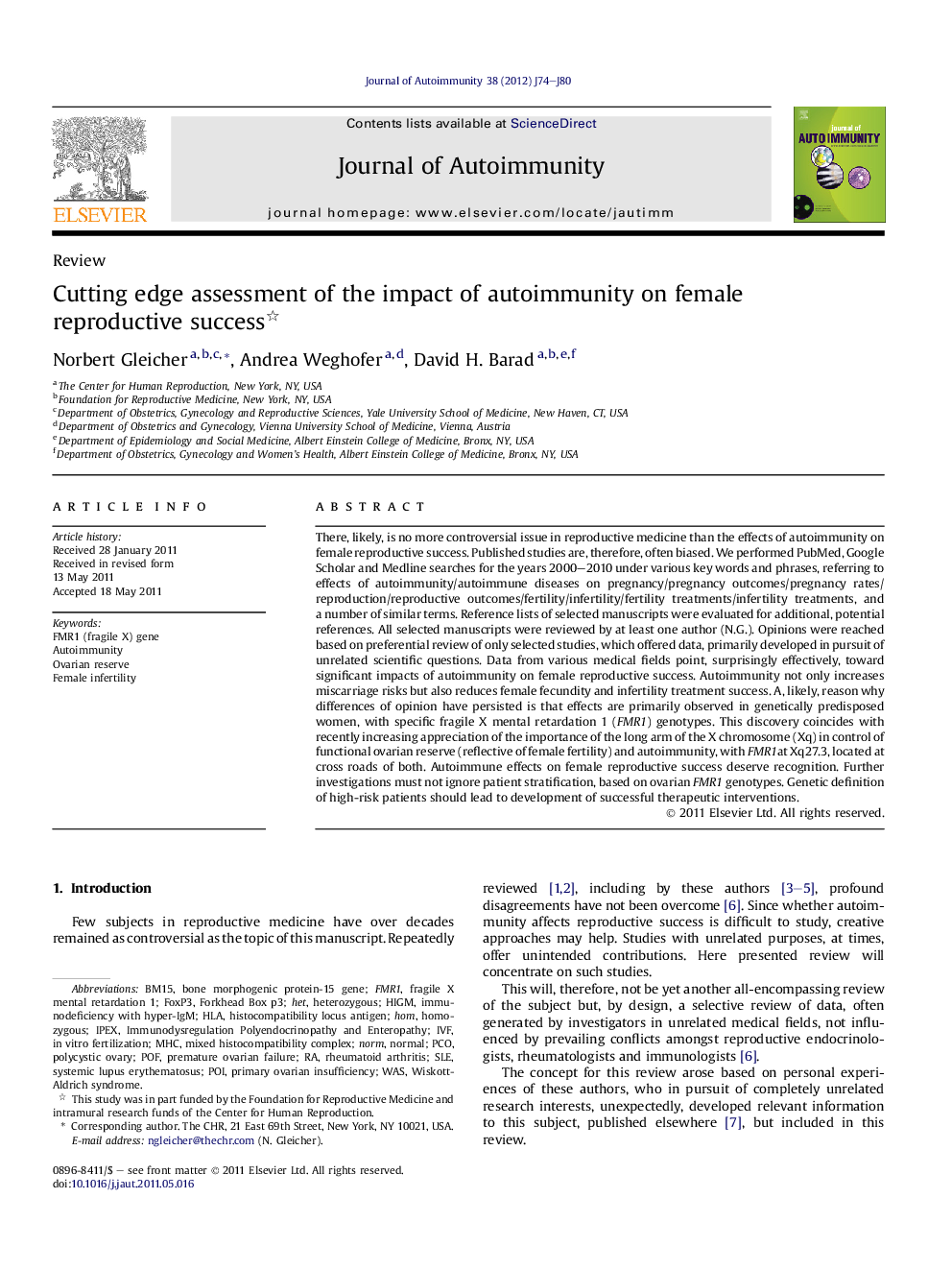| کد مقاله | کد نشریه | سال انتشار | مقاله انگلیسی | نسخه تمام متن |
|---|---|---|---|---|
| 6119389 | 1592310 | 2012 | 7 صفحه PDF | دانلود رایگان |
عنوان انگلیسی مقاله ISI
Cutting edge assessment of the impact of autoimmunity on female reproductive success
دانلود مقاله + سفارش ترجمه
دانلود مقاله ISI انگلیسی
رایگان برای ایرانیان
کلمات کلیدی
IPEXPOFPCOPOIFmr1HIGMfragile X mental retardation 1FOXP3HET - ITRheumatoid arthritis - آرتریتروماتوئیدHLA - آنتیژن گلبول سفید انسانیWAS - بودpolycystic ovary - تخمدان پلی کیستیکforkhead box P3 - جعبه جعبه P3autoimmunity - خودایمنیovarian reserve - ذخیره تخمدانیWiskott-Aldrich syndrome - سندرم Wiskott-AldrichNormal - طبیعیIn vitro fertilization - لقاح آزمایشگاهیIVF - لقاح مصنوعی Systemic lupus erythematosus - لوپوس اریتماتوی سیستمیکSLE - لوپوس منتشر یا لوپوس اریتماتوس سیستمیکMHC - مجموعه سازگاری بافتی اصلیhom - منمfemale infertility - ناباروری زنانPrimary ovarian insufficiency - نارسایی اولیه تخمدانpremature ovarian failure - نارسایی زودرس تخمدانNorm - نورمheterozygous - هتروزیگوتhomozygous - هموزیگوت
موضوعات مرتبط
علوم زیستی و بیوفناوری
ایمنی شناسی و میکروب شناسی
ایمونولوژی
پیش نمایش صفحه اول مقاله

چکیده انگلیسی
There, likely, is no more controversial issue in reproductive medicine than the effects of autoimmunity on female reproductive success. Published studies are, therefore, often biased. We performed PubMed, Google Scholar and Medline searches for the years 2000-2010 under various key words and phrases, referring to effects of autoimmunity/autoimmune diseases on pregnancy/pregnancy outcomes/pregnancy rates/reproduction/reproductive outcomes/fertility/infertility/fertility treatments/infertility treatments, and a number of similar terms. Reference lists of selected manuscripts were evaluated for additional, potential references. All selected manuscripts were reviewed by at least one author (N.G.). Opinions were reached based on preferential review of only selected studies, which offered data, primarily developed in pursuit of unrelated scientific questions. Data from various medical fields point, surprisingly effectively, toward significant impacts of autoimmunity on female reproductive success. Autoimmunity not only increases miscarriage risks but also reduces female fecundity and infertility treatment success. A, likely, reason why differences of opinion have persisted is that effects are primarily observed in genetically predisposed women, with specific fragile X mental retardation 1 (FMR1) genotypes. This discovery coincides with recently increasing appreciation of the importance of the long arm of the X chromosome (Xq) in control of functional ovarian reserve (reflective of female fertility) and autoimmunity, with FMR1at Xq27.3, located at cross roads of both. Autoimmune effects on female reproductive success deserve recognition. Further investigations must not ignore patient stratification, based on ovarian FMR1 genotypes. Genetic definition of high-risk patients should lead to development of successful therapeutic interventions.
ناشر
Database: Elsevier - ScienceDirect (ساینس دایرکت)
Journal: Journal of Autoimmunity - Volume 38, Issues 2â3, May 2012, Pages J74-J80
Journal: Journal of Autoimmunity - Volume 38, Issues 2â3, May 2012, Pages J74-J80
نویسندگان
Norbert Gleicher, Andrea Weghofer, David H. Barad,